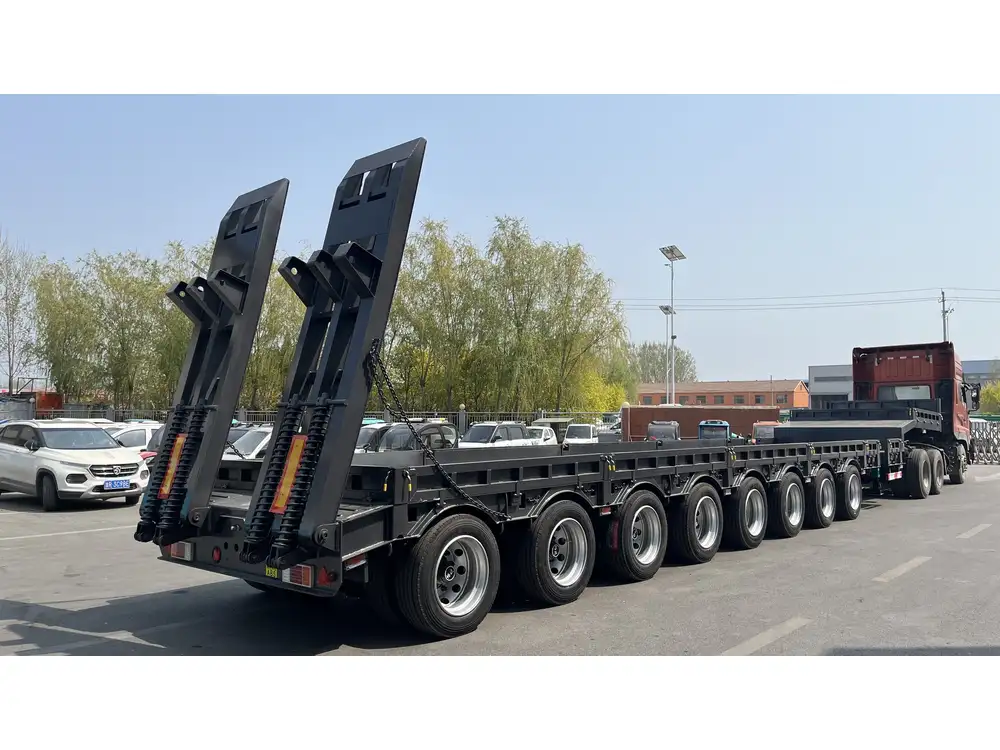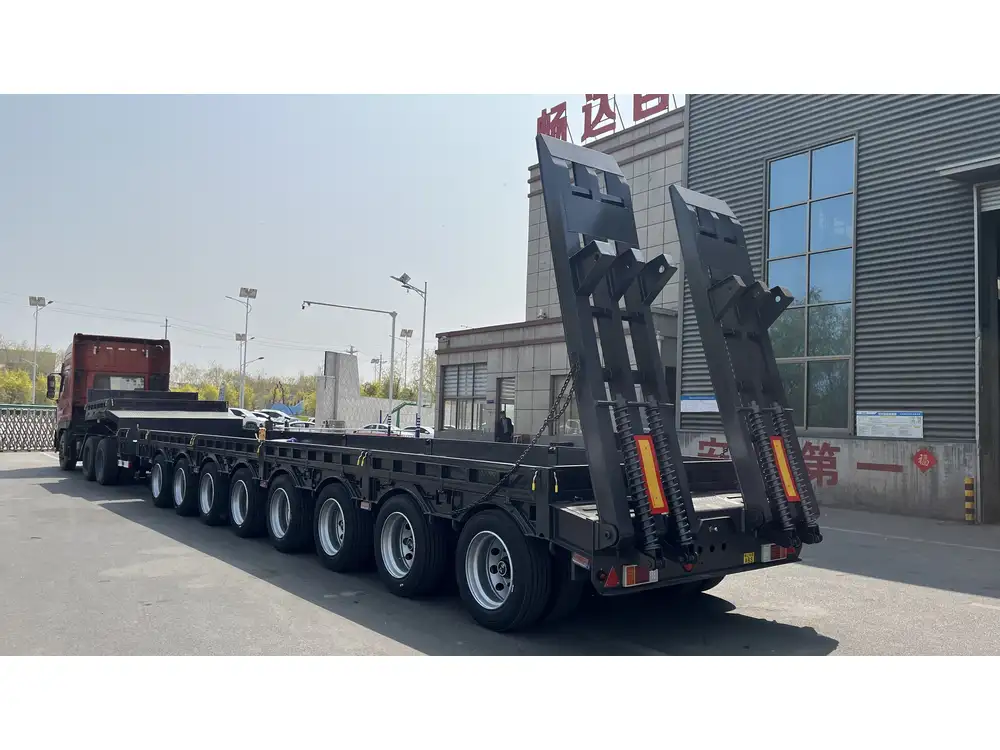When it comes to the transportation of heavy machinery like tractors, understanding the capabilities and limitations of your hauling equipment is paramount. One common question that arises among contractors, farmers, and heavy equipment operators is whether it is feasible—or practical—to haul a tractor using a dump trailer. In this comprehensive guide, we will delve deep into this topic, examining the specifications, safety considerations, and best practices involved in making this choice.
Understanding Dump Trailers: An Overview
Dump trailers are specialized vehicles designed primarily for carrying loose materials such as sand, gravel, or debris. They feature a hinged rear door and can be raised at an angle to unload their contents easily. Unlike traditional flatbed trailers, dump trailers can provide a level of versatility that prompts questions about their suitability for hauling equipment.
Key Features of Dump Trailers
| Feature | Description |
|---|---|
| Load Capacity | Typically ranges from 5,000 to 20,000 pounds, depending on the model. |
| Construction Materials | Made from high-strength steel or aluminum to endure heavy workloads. |
| Tipping Mechanism | Uses hydraulic systems for lifting, allowing for efficient unloading. |
| Axles and Suspension | Designed with robust axles and heavy-duty suspension systems to support substantial weight. |
The load capacity of dump trailers can vary significantly, impacting their ability to transport a tractor effectively. Knowing the weight of your tractor is the first step in determining whether a dump trailer can handle the task.

Weight Considerations and Tractor Specifications
Before attempting to haul a tractor, it’s crucial to understand the weight classification of your specific machine. Various tractor models can vary widely in terms of weight:
| Tractor Model | Approximate Weight |
|---|---|
| Compact Tractors | 1,500 – 3,500 lbs |
| Utility Tractors | 3,000 – 6,000 lbs |
| Mid-Size Tractors | 6,000 – 12,000 lbs |
| Heavy-Duty Tractors | 12,000 lbs and above |
Example Weight Breakdown
Consider a typical situation:
- Compact Tractor: 2,500 lbs
- Dump Trailer Weight: 3,000 lbs
- Total Weight: 5,500 lbs
If the total weight exceeds your dump trailer’s load capacity, you risk damaging both the tractor and the trailer, as well as violating road safety regulations.
Assessing Compatibility: Can A Dump Trailer Haul a Tractor?

1. Load Capacity Evaluation
It’s critical to ensure that the total weight of the tractor and any additional equipment or attachments falls well within the specified limits of your dump trailer. If your dump trailer has a capacity of, say, 10,000 lbs and your tractor weighs 6,000 lbs, the possibility of safely hauling it remains viable—as long as you follow several additional precautions.
2. Trailer Design and Configuration
Dump trailers are designed for bulk materials, and their surface may not have the features necessary to secure a tractor effectively. Unlike specialized equipment trailers that are built with tie-down points and full-length ramps, a typical dump trailer might lack these features.
A side-by-side comparison can illustrate the key differences:
| Feature | Dump Trailer | Equipment Trailer |
|---|---|---|
| Design Purpose | Designed for loose materials | Designed for heavy equipment |
| Ramps | Often does not include ramps | Equipped with foldable ramps |
| Tie-Down Points | May have limited points | Typically has multiple points |
| Load Stabilization | Configuration may be inadequate | Built for secure load stability |
3. Suspension and Stability
Hauling a tractor can shift its center of gravity. Dump trailers are not equipped with the same level of suspension demanded by heavy equipment, which can lead to unstable transportation and potential accidents if the load shifts during transit.

Safety Concerns When Hauling a Tractor in a Dump Trailer
1. Weight Distribution
One of the primary concerns when hauling a tractor in a dump trailer is related to weight distribution. An uneven load can cause swaying, leading to possible overturning or loss of control.
- Ensure the tractor is positioned as close to the trailer’s axle as possible.
- Consider using weight distribution systems to alleviate pressure on the hitch.
2. Proper Securing of Load
Using effective tie-down methods is invaluable for transporting a tractor safely. If a dump trailer does not have designated tie-down points, you can employ the following techniques:
- Use ratchet straps and chains to secure the tractor.
- Ensure that the securing methods can withstand movement and vibrations during transit.

3. Legal Compliance
Ensure you are compliant with local legal standards regarding load transportation. Many jurisdictions have specific regulations covering:
- Maximum load capacities
- Securing requirements
- Trailer conditions
4. Trailer Brakes and Lighting
Always check that your dump trailer’s braking system is fully operational. Since tractors are heavier than standard loads, the braking distance can increase significantly. Ensuring that lights and indicators work correctly will help other drivers be aware of your presence on the road.
Alternatives to Hauling a Tractor in a Dump Trailer
Given the concerns surrounding the use of dump trailers for hauling tractors, consideration should be given to alternative options that are specifically tailored for the job:

1. Equipment Trailers
Equipment trailers are engineered for safely transporting heavy machinery. They come with:
- Ramps for easy loading and unloading
- Multiple securing points for stabilization
- Better weight distribution features
2. Lowboy Trailers
For particularly heavy machinery, lowboy trailers provide an ideal option. They allow for lower center gravity and superior stability during transportation.
- Advantages: Better suited for oversized equipment and more stable during transit.
- Disadvantages: May require special permits for operation on certain roadways.
Conclusion: The Viability of Hauling a Tractor in a Dump Trailer
In summary, while it is feasible to haul a tractor using a dump trailer, it is fraught with challenges and risks. Key factors such as weight capacity, securing methods, and legal requirements must be meticulously assessed to prevent accidents and ensure compliance. If you find yourself needing to transport heavy machinery regularly, investing in a dedicated equipment trailer or a lowboy may provide greater long-term benefits, not merely in terms of safety but also efficiency.

Summary of Considerations
- Load Capacity: Ensure tractor weight does not exceed trailer limits.
- Design Appropriateness: Evaluate if the dump trailer is suitable for securing a tractor.
- Safety Measures: Utilize proper weight distribution, securing methods, and comply with legal standards.
In the end, the choice rests with the operator and their operational needs; however, it’s clear that while a dump trailer can serve the purpose of hauling a tractor, specialized trailers offer a far superior option in terms of safety and practicality.



